diff options
Diffstat (limited to 'web/gui/README.md')
| -rw-r--r-- | web/gui/README.md | 165 |
1 files changed, 165 insertions, 0 deletions
diff --git a/web/gui/README.md b/web/gui/README.md new file mode 100644 index 00000000..2b73ad26 --- /dev/null +++ b/web/gui/README.md @@ -0,0 +1,165 @@ +# Legacy Agent dashboard + +> ⚠️ You're checking the documentation for the legacy Agent dashboard. For the current version please check [Accessing Netdata Dashboards](https://github.com/netdata/netdata/blob/master/docs/category-overview-pages/accessing-netdata-dashboards.md). + + +The local Netdata Agent dashboard is the heart of Netdata's performance troubleshooting toolkit. You've probably seen it +before: + +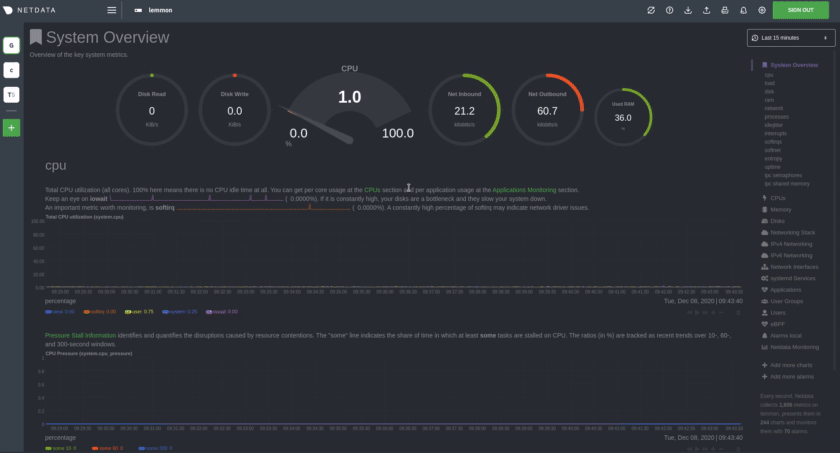 + +Learn more about how dashboards work and how they're populated using the `dashboards.js` file in our [web dashboards +overview](https://github.com/netdata/netdata/blob/master/web/README.md). + +By default, Netdata starts a web server for its dashboard at port `19999`. Open up your web browser of choice and +navigate to `http://NODE:19999`, replacing `NODE` with the IP address or hostname of your Agent. If installed on localhost, +you can access it through `http://localhost:19999`. + +Netdata uses an [internal, static-threaded web server](https://github.com/netdata/netdata/blob/master/web/server/README.md) to host the HTML, CSS, and JavaScript +files that make up the local Agent dashboard. You don't have to configure anything to access it, although you can adjust +[your settings](https://github.com/netdata/netdata/blob/master/web/server/README.md#other-netdataconf-web-section-options) in the `netdata.conf` file, or run Netdata +behind an [Nginx proxy](https://github.com/netdata/netdata/blob/master/docs/Running-behind-nginx.md), and so on. + +## Navigating the local dashboard + +Beyond charts, the local dashboard can be broken down into three key areas: + +- [Local Agent dashboard](#local-agent-dashboard) + - [Navigating the local dashboard](#navigating-the-local-dashboard) + - [Sections](#sections) + - [Time \& date picker](#time--date-picker) + - [Metrics menus](#metrics-menus) + - [Cloud menus (Spaces, War Rooms, and Visited nodes)](#cloud-menus-spaces-war-rooms-and-visited-nodes) + - [Customizing the local dashboard](#customizing-the-local-dashboard) + - [Custom dashboards](#custom-dashboards) + +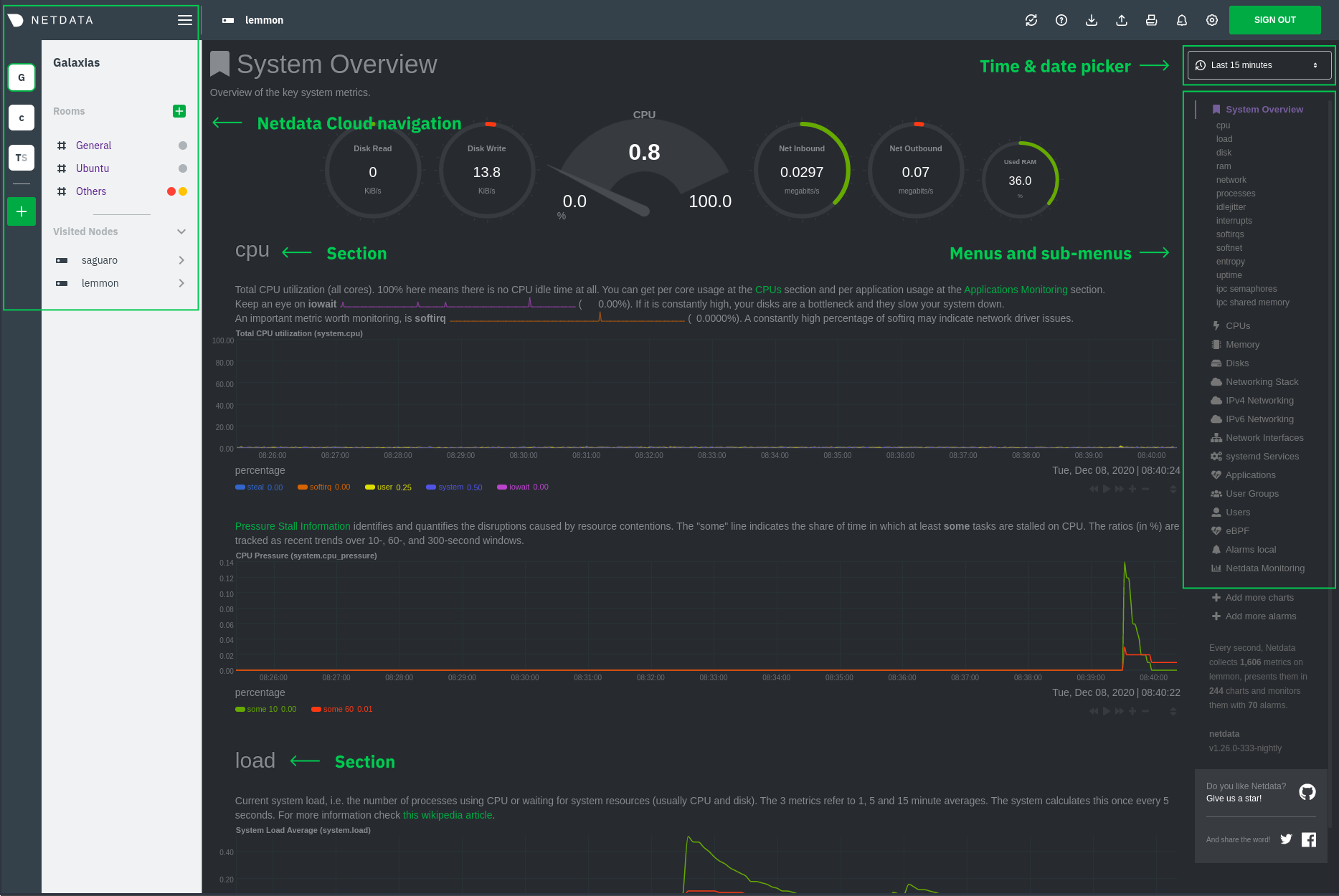 + +### Sections + +Netdata is broken up into multiple **sections**, such as **System Overview**, +**CPU**, **Disk**, and more. Inside each section you'll find a number of charts, +broken down into [contexts](https://github.com/netdata/netdata/blob/master/web/README.md#contexts) and +[families](https://github.com/netdata/netdata/blob/master/web/README.md#families). + +An example of the **Memory** section on a Linux desktop system. + +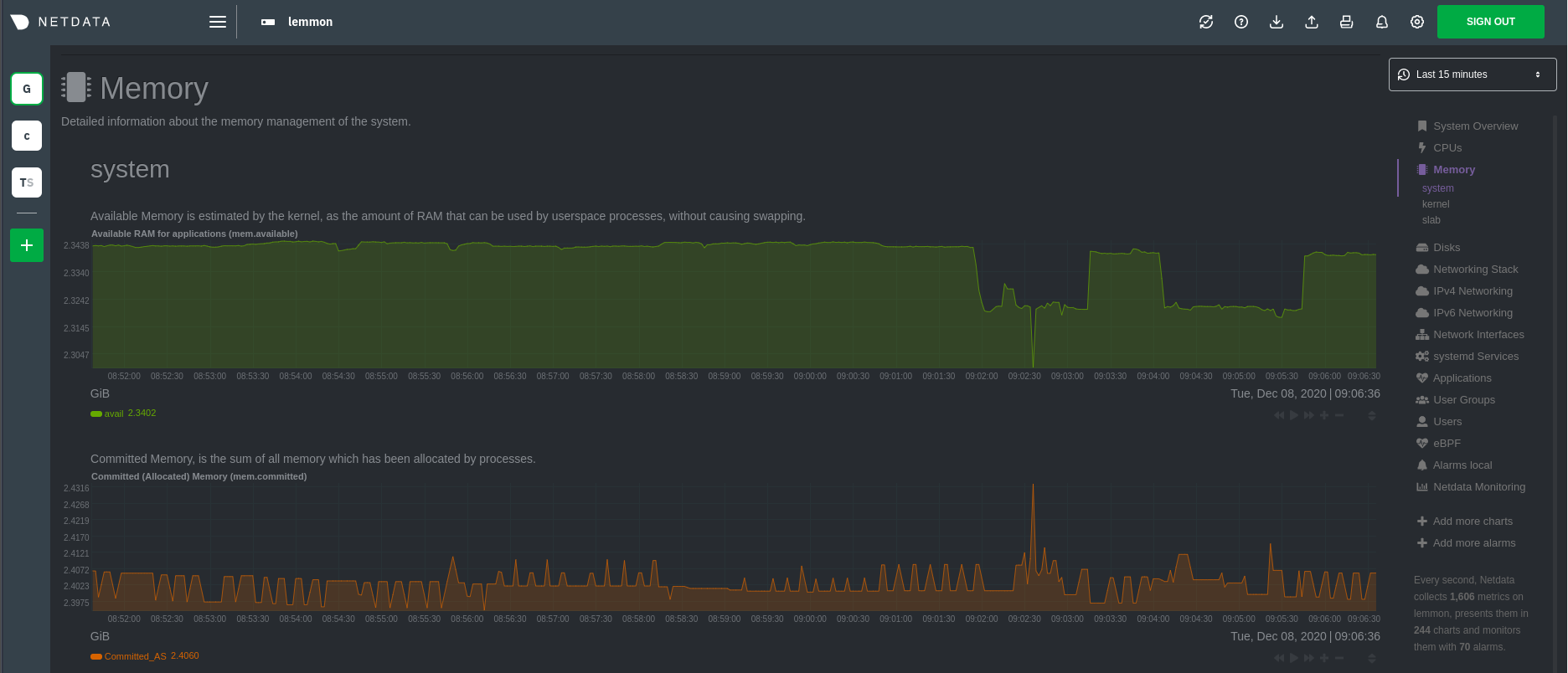 + +All sections and their associated charts appear on a single page, so all you need to do to view different sections is +scroll up and down. But it's usually quicker to use the [menus](#metrics-menus). + +### Time & date picker + +The local dashboard features a time & date picker to help you visualize specific timeframes of historical metrics. The +picker chooses an appropriate default to always show per-second granularity based on the width of your browser's +viewport. + +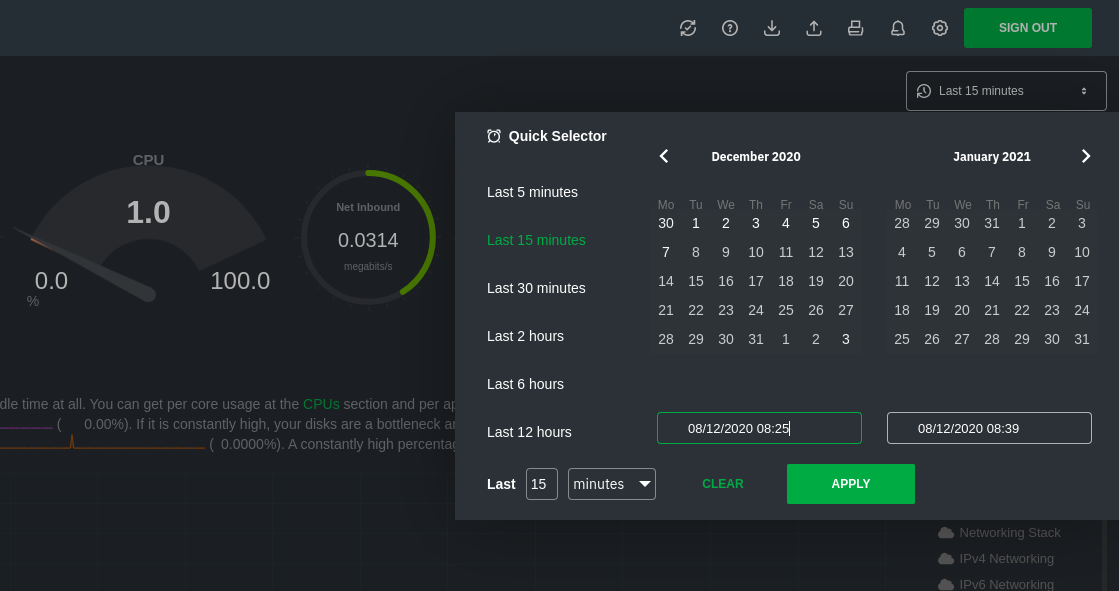 + +Use the Quick Selector to show metrics from the last 5 minutes, 15 minutes, 30 minutes, 2 hours, 6 hours, or 12 hours. + +Beneath the Quick Selector is an input field and dropdown you use in combination to select a specific timeframe of +minutes, hours, days, or months. Enter a number and choose the appropriate unit of time. + +Use the calendar to select multiple days. Click on a date to begin the timeframe selection, then an ending date. + +Click **Apply** to re-render all visualizations with new metrics data, or **Clear** to restore the default timeframe. + +[Increase the metrics retention policy](https://github.com/netdata/netdata/blob/master/docs/store/change-metrics-storage.md) for your node to see more historical +timeframes. + +### Metrics menus + +**Metrics menus** appears on the right-hand side of the local Agent dashboard. Netdata generates a menu for each +section, and menus link to the section they're associated with. + +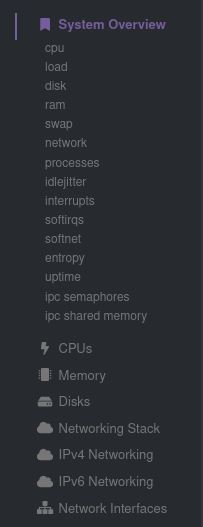 + +Most metrics menu items will contain several **submenu** entries, which represent any +[families](https://github.com/netdata/netdata/blob/master/web/README.md#families) from that section. Netdata automatically +generates these submenu entries. + +Here's a **Disks** menu with several submenu entries for each disk drive and +partition Netdata recognizes. + +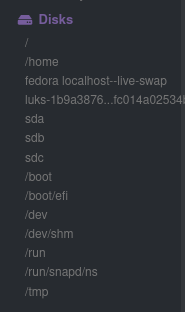 + +### Cloud menus (Spaces, War Rooms, and Visited nodes) + +The dashboard also features a menu related to Netdata Cloud functionality. You can view your existing Spaces or create +new ones via the left vertical column of boxes. This menu also displays the name of your current Space, shows a list of +any War Rooms you've added you your Space, and lists any notes you recently visited via their Agent dashboards. Click on +a War Room's name to jump to the Netdata Cloud web interface. + +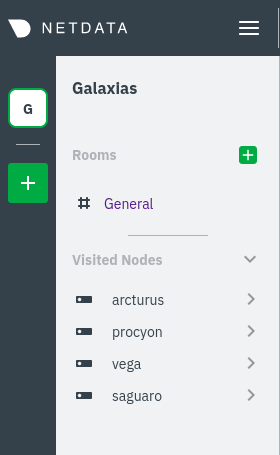 + +## Customizing the local dashboard + +Netdata stores information about individual charts in the `dashboard_info.js` +file. This file includes section and subsection headings, descriptions, colors, +titles, tooltips, and other information for Netdata to render on the dashboard. + +For example, here is how `dashboard_info.js` defines the **System Overview** +section. + +```javascript +netdataDashboard.menu = { + 'system': { + title: 'System Overview', + icon: '<i class="fas fa-bookmark"></i>', + info: 'Overview of the key system metrics.' + }, +``` + +If you want to customize this information, you should avoid editing +`dashboard_info.js` directly. These changes are not persistent; Netdata will +overwrite the file when it's updated. Instead, you should create a new file with +your customizations. + +We created an example file at `dashboard_info_custom_example.js`. You can +copy this to a new file with a name of your choice in the `web/` directory. This +directory changes based on your operating system and installation method. If +you're on a Linux system, it should be at `/usr/share/netdata/web/`. + +```shell +cd /usr/share/netdata/web/ +sudo cp dashboard_info_custom_example.js your_dashboard_info_file.js +``` + +Edit the file with your customizations. For example: + +```javascript +customDashboard.menu = { + system: { + title: "Testing, testing, 1 2 3", + icon: '<i class="fas fa-thumbs-up"></i>', + info: "This is overwritten info for the system overview section!" + } +}; +``` + +Finally, tell Netdata where you placed your customization file by replacing +`your_dashboard_info_file.js` below. + +```conf +[web] + custom dashboard_info.js = your_dashboard_info_file.js +``` + +Once you restart Netdata, refresh the dashboard to find your custom +configuration: + + + +## Custom dashboards + +For information on creating custom dashboards from scratch, see the [custom dashboards](https://github.com/netdata/netdata/blob/master/web/gui/custom/README.md) or +[Atlassian Confluence dashboards](https://github.com/netdata/netdata/blob/master/web/gui/confluence/README.md) guides. |
